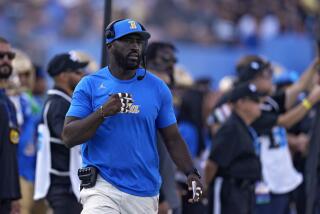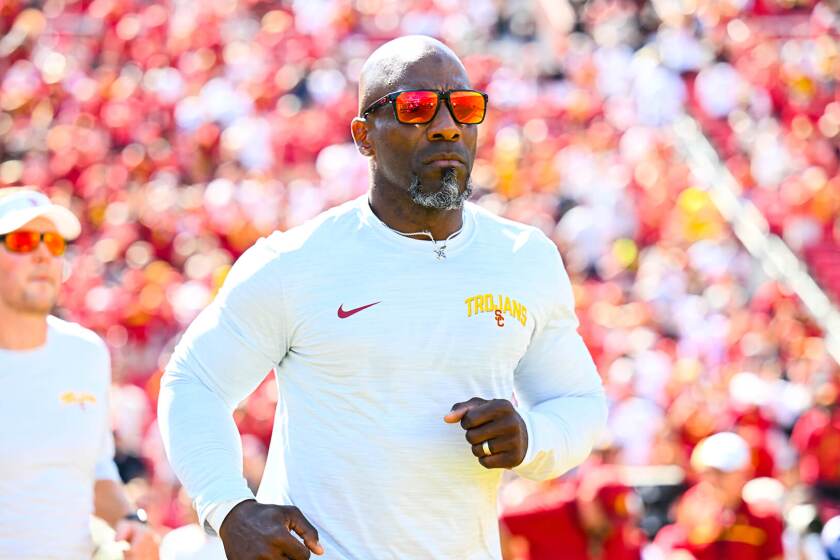Measles Threat Stirs Talk of Delaying Game
- Share via
Public health officials said Thursday that Saturday’s UCLA-USC football game at the Rose Bowl could become a focal point of a measles outbreak that has already sickened USC’s star quarterback Rodney Peete and at least 40 other students.
The potential for contagion, which has introduced an unexpected element into one of the country’s most vigorous sports rivalries, prompted some public health officials to consider urging postponement of the game. As of Thursday night, however, no such recommendations had been officially issued.
Infectious disease experts were cautious in their assessment of the situation. They agreed, however, that the presence in the Rose Bowl of several thousand USC students who may have been infected in the campus outbreak but who are not yet symptomatic poses a potentially serious health risk.
As just one victim in the USC outbreak, Peete is a comparatively minor aspect of the problem, these experts say. USC ordered its entire football team vaccinated against measles earlier this week and, late Thursday afternoon, UCLA said it would do the same before game time Saturday.
Dr. Stephen Waterman, chief of adult communicable disease control for the Los Angeles County Department of Health Services, said county health officials had considered suggesting a postponement of the game but decided not to make such a request because “we really thought it would be unrealistic,” in view of the intense sports rivalry and the fact that as many as 100,000 football fans are expected.
But Dr. Lawrence Ross, an infectious disease control specialist at Childrens Hospital, said that in view of the risk of disease transmission among spectators and infection among members of the USC football team and the potential risk to their UCLA opponents, a two-week postponement of the game would be appropriate.
“I think it would be in the best interests of everyone--the fans, the players, everyone,” Ross said.
Can Be Serious
In the vast majority of cases, the disease is comparatively minor. But experts say a small percentage of victims experience potentially life-threatening complications, the most common of which is encephalitis, an inflammation of the brain.
USC has already established a special measles vaccination program and the university will sponsor a four-hour immunization drive today in front of the Tommy Trojan statue on the university’s Exposition Park Campus. UCLA said it, too, will offer students measles immunizations today, Saturday and Monday.
Immunization is effective if it is given before or any time up to 72 hours after contact with the virus, according to doctors.
But public health experts agreed that many at the game may be young people in their teens through about age 30, as many as 10% to 20% of whom would be unprotected against the disease because they were never vaccinated. Teen-agers and young adults now make up the group in which measles most often occurs in outbreak form, said Newhall pediatrician Dr. Loraine Stern, a past president of the American Academy of Pediatrics.
Dr. Edgar Marcuse, a University of Washington expert who is a member of the Academy of Pediatrics’ Committee on Infectious Diseases, said that while outright postponement of the game might not be economically possible, health officials should at least consider barring spectators from the Rose Bowl in Pasadena.
Risk Called Slight
Some experts were more restrained. Dr. Paul Wehrle, chairman of the pediatrics department at UC Irvine and an expert in infectious diseases, said the actual risk of infection among spectators is probably slight. “The only way you are going to control this disease,” said Wehrle, “is by intensive immunization. If you don’t play the game, students at USC will just congregate somewhere else.”
“It’s an extremely difficult thing to call,” said Marcuse. “Every step has to be taken to try to protect susceptible individuals who are likely to be infected by this outbreak. What you need to do rapidly is to try to identify the susceptible people and get them immunized.”
“Exposure (in the context of a football crowd) is a wide-open possibility,” said Dr. Mary Sprauer, an epidemiologist with the federal government’s Centers for Disease Control in Atlanta. “I would have to say there is the possibility that these people could get measles.”
Waterman said that adults who decide to attend the Rose Bowl contest should be discouraged from bringing young children with them. He said that as many as 40% to 50% of preschoolers in Los Angeles County may not be immunized against measles.
Waterman said the health department has recommended that players on both squads be examined before the game and that any player with measles symptoms be withheld from competition.
Measles, health experts said, is transmitted by a process called virus shedding in which droplets expelled from the nose, throat and mouth come in contact with uninfected individuals. Measles is one of the most easily transmitted of all diseases. It can be spread by an infected person for four days before any symptoms appear until four to five days after the initial rash, fever and cough are noticed.
USC quarterback Peete should be over the contagious stage by today, doctors said.
“There is obviously going to be mingling of students from both sides and there could be USC students shedding the virus who are in the early stage of the disease,” Waterman said of the potential for transmission in the Rose Bowl grandstands. “I certainly would encourage any student from USC who has any symptoms of fever and cough and red eyes and rash to stay home.”
Waterman said the spread of the USC outbreak to the university’s football team may have the inadvertent effect of calling significant public attention to the existence of large numbers of college-age young people who are at risk. Having had the measles or being vaccinated accords lifetime immunity.
Young Are Susceptible
Waterman and Ross said teen-agers and young adults are especially susceptible to measles because they were born after vaccines were developed and the disease began to decrease in prevalence. Because most people born more than 30 years ago were naturally exposed to the disease in the pre-vaccine days, middle-aged adults are generally immune.
“We have been urging various college campuses in California and Los Angeles County to implement a mandatory immunization policy,” Waterman said. “We’ve been unsuccessful in convincing them except for the Cal State system (which began such a program in 1985). There is a large, susceptible population of students.”
Marcuse said it is “shocking” that such large numbers of young adults are at risk of developing measles. He said the infection of USC’s star quarterback may prod sports programs at campuses throughout the country to require measles immunization of players.
More to Read
Go beyond the scoreboard
Get the latest on L.A.'s teams in the daily Sports Report newsletter.
You may occasionally receive promotional content from the Los Angeles Times.






